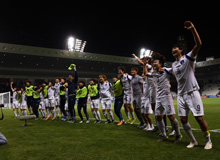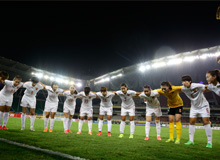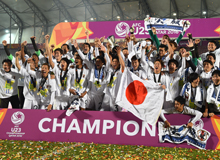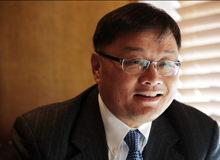EAST ASIAN FOOTBALL FEDERATION

COLUMN

【Japan's Olympic Squad】Rio Olympic Games Review
+
10passion
After finishing the previous Olympic Games in London in the fourth place due to a defeat to Korea REP., Japan had set themselves the goal of winning a medal in Rio, also because they had qualified for the Games as Asian champions this time. With a solid defense and swift combination plays in attack as the team’s main strength, Japan had prepared for testing climate as well, for their first two games in tropical Manaus and the third one in Salvador. However, the formidable physical strength of their first opponents Nigeria saw the team fumble in numerous occasions in defense, which gave the African side a three goal lead. From that point a cross from Hiroki Fujiharu found forward Takuma Asano’s heel for a goal, which spurred another goal in additional time when Musashi Suzuki was fed a brilliant pass by Ryota Ohshima. He made his way past the defenders and struck the ball with his left foot. Despite such efforts, the team lost the game 5-4.
In their match against Colombia the team made an admirable start, playing shoulder to shoulder with their opponents. However, in the second half a counter attack that started with a loss of the ball in midfield and an own goal gave the Colombian side a two goal lead. Refusing to give up, the Japanese side retaliated with their central offensive players Oshima, Takumi Minamino, and Asano connecting for a speedy strike that resulted in a goal. This was followed by a wonderful mid-range shot by Shoya Nakajima that helped the side draw the match.
In the third match against Sweden both teams employed a 4-4-2 formation. In the 65th minute Shinya Yajima came onto the pitch and made a well-timed sprint toward a final pass by Oshima that gave the team the lead. The side then managed to hold their defensive line against a physically stronger team, resulting in a 1-0 victory. However, due to group leaders Nigeria’s loss against Colombia, Japan saw them eliminated from the competition in the initial group stage. The lack of international experience shown also in the manner in which they started the competition was surely among the problems, but one of the main targets for the future is now for the young players to establish their place in the full national side after they experienced the battle on the world stage.
NEXTBACK
In their match against Colombia the team made an admirable start, playing shoulder to shoulder with their opponents. However, in the second half a counter attack that started with a loss of the ball in midfield and an own goal gave the Colombian side a two goal lead. Refusing to give up, the Japanese side retaliated with their central offensive players Oshima, Takumi Minamino, and Asano connecting for a speedy strike that resulted in a goal. This was followed by a wonderful mid-range shot by Shoya Nakajima that helped the side draw the match.
In the third match against Sweden both teams employed a 4-4-2 formation. In the 65th minute Shinya Yajima came onto the pitch and made a well-timed sprint toward a final pass by Oshima that gave the team the lead. The side then managed to hold their defensive line against a physically stronger team, resulting in a 1-0 victory. However, due to group leaders Nigeria’s loss against Colombia, Japan saw them eliminated from the competition in the initial group stage. The lack of international experience shown also in the manner in which they started the competition was surely among the problems, but one of the main targets for the future is now for the young players to establish their place in the full national side after they experienced the battle on the world stage.




![[Men's] Summary of the EAFF E-1 Football Championship Round 1 Guam](https://image.eaff.com/index/3380.jpg)
![[Women's] Summary of the EAFF E-1 Football Championship Round 1 Guam](https://image.eaff.com/index/3379.jpg)



